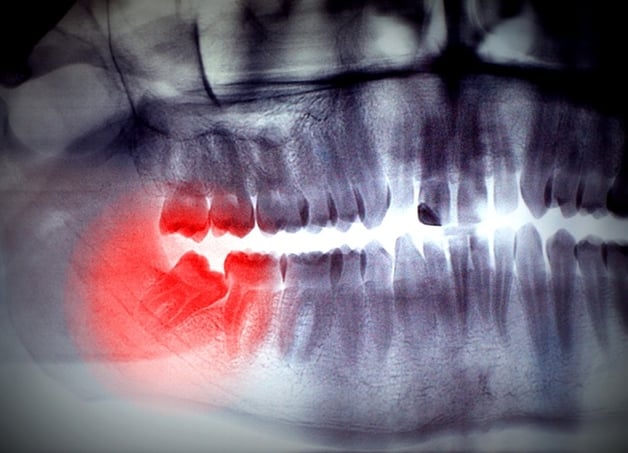
For most people, wisdom teeth are generally known as the molars in the back of the mouth that get removed during your teen years. While that's mostly true, there's a lot more to these oral features. When it comes to your dental health, it's important to make informed decisions. Your dentist will guide you along the right path, but as a patient, you have a responsibility to provide your own insight and keep open communication with these dental health professionals. Here's what you need to know about your wisdom teeth:
Wisdom teeth
Wisdom teeth are also referred as the third molars, and they grow in the very back of your mouth. In fact, they are the last teeth to come in during adulthood, which is why they're called "wisdom" teeth.1 They typically appear between the ages of 17 and 21.2 However, this timeline isn't set in stone. Wisdom teeth can emerge any time after the first two sets of molars grow in, and some never erupt at all. A dentist can help determine when your wisdom teeth are growing with X-rays and regular exams, but you may also feel them growing.
"You can't control the direction your third molars grow."
If everyone's teeth were perfectly aligned and every mouth had plenty of space, wisdom teeth wouldn't be a problem. However, even if you've had braces, you can't control the direction in which your third molars grow. Many times, especially when there's not enough room in your mouth, wisdom teeth will erupt in any position but straight up. They can grow forward, outward or tilted, and can even become impacted.
Impacted tooth
An impacted tooth occurs when the molar becomes fully or partly stuck below the gumline.3 When teeth fully emerge, the gum naturally recedes. However, when an impacted tooth only sticks out part way, a flap of gum tissue may start to grow over it. This excess tissue can easily trap food and bacteria and cause an infection, making an impacted wisdom tooth a serious risk to your oral health and overall well-being.
Symptoms of an impacted tooth
Impacted wisdom teeth have a tendency to develop an infection called pericoronitis, which can cause the gums to become swollen and painful.2 This discomfort can manifest itself in nearby teeth, the ear and even the side of the face. Pericoronitis can be prevented with proper oral care. However, if it occurs, it can lead to bad breath or taste in the mouth, discharge of pus from gum near the impacted tooth, and even more serious symptoms including, jaw muscle spasms, facial swelling and swollen lymph nodes under the chin.4

Jaw pain may be a sign of an impacted tooth.
An impacted wisdom tooth and the pericoronitis associated with it must be diagnosed during a clinical exam by your dental professional, making bi-annual dental visits all the more important. Be sure to include regular dentist appointments as part of your family dental plan.
When wisdom teeth become a problem
Whether or not pericoronitis develops, an impacted tooth puts you at constant risk for the infection. Your dental health professional may suggest removing the extra gum tissue or extracting the wisdom teeth altogether. A simple exam of the area will help him or her determine whether an impacted tooth is at play.
Your dentist may suggest getting your wisdom teeth removed even if they aren't impacted. Unless the wisdom tooth has ample room and can grow directly up, it may cause infection, cysts, damage to adjacent teeth, tumors and tooth decay. When wisdom teeth aren't removed, the conditions could worsen.
If you're feeling mouth pains and you suspect your third molars may be growing, speak with your dental health professional. He or she can guide you down the right track for a healthy and pain-free smile.
_____________________________________________________________________________
1. "Wisdom Teeth," American Dental Association. http://www.mouthhealthy.org/en/az-topics/w/wisdom-teeth
2. "Impacted Tooth," Colgate, Sept. 16, 2013. http://www.colgate.com/en/us/oc/oral-health/conditions/wisdom-teeth/article/impacted-tooth
3. "Wisdom teeth: Should they stay or go?" Kim Painter, USA Today, June 2, 2013. http://www.usatoday.com/story/news/nation/2013/06/02/wisdom-teeth-surgery/2369593/
4. "Pericoronitis (Infection Near Wisdom Tooth)," Colgate. http://www.colgateprofessional.com/patient-education/articles/periocoronitis-infection-near-wisdom-tooth
